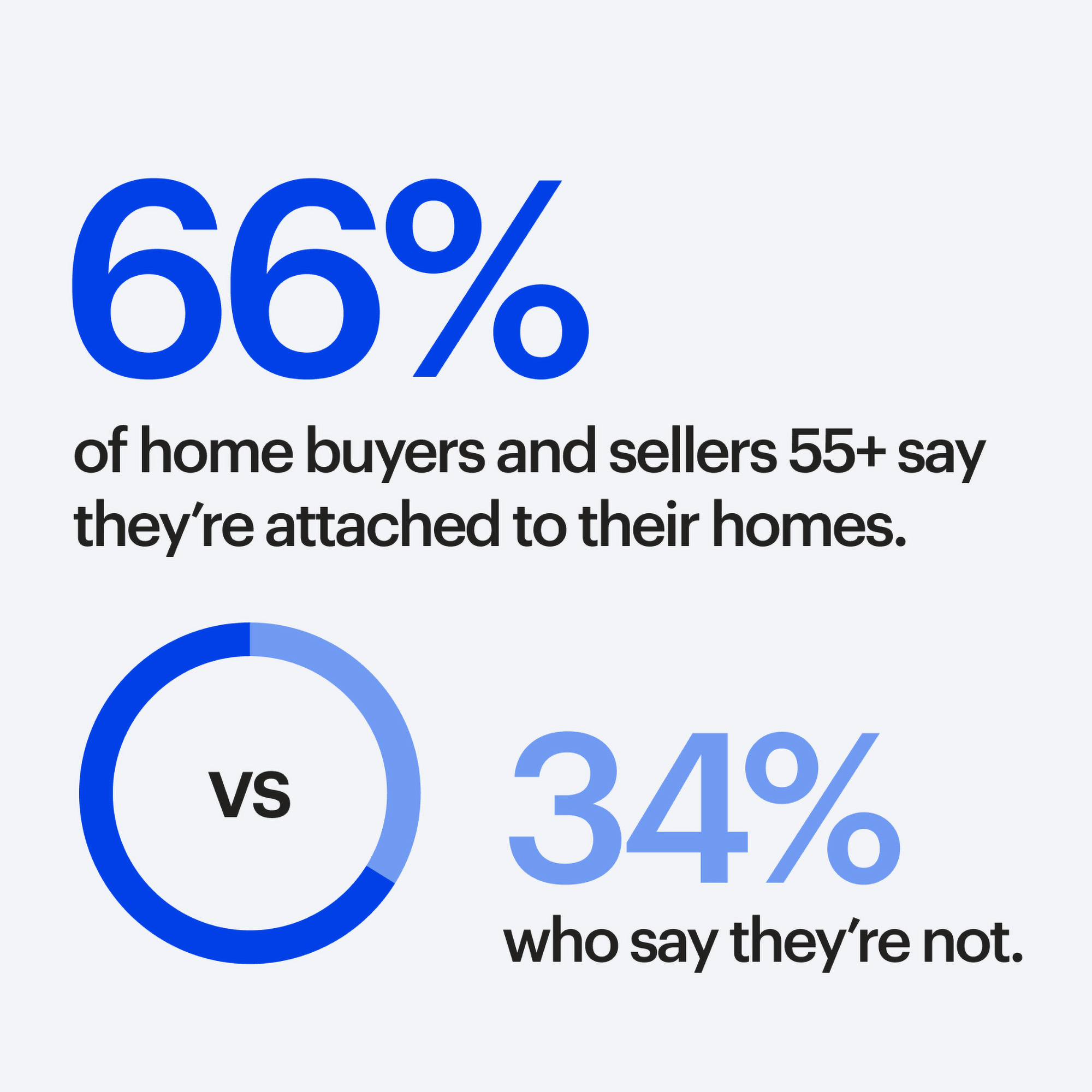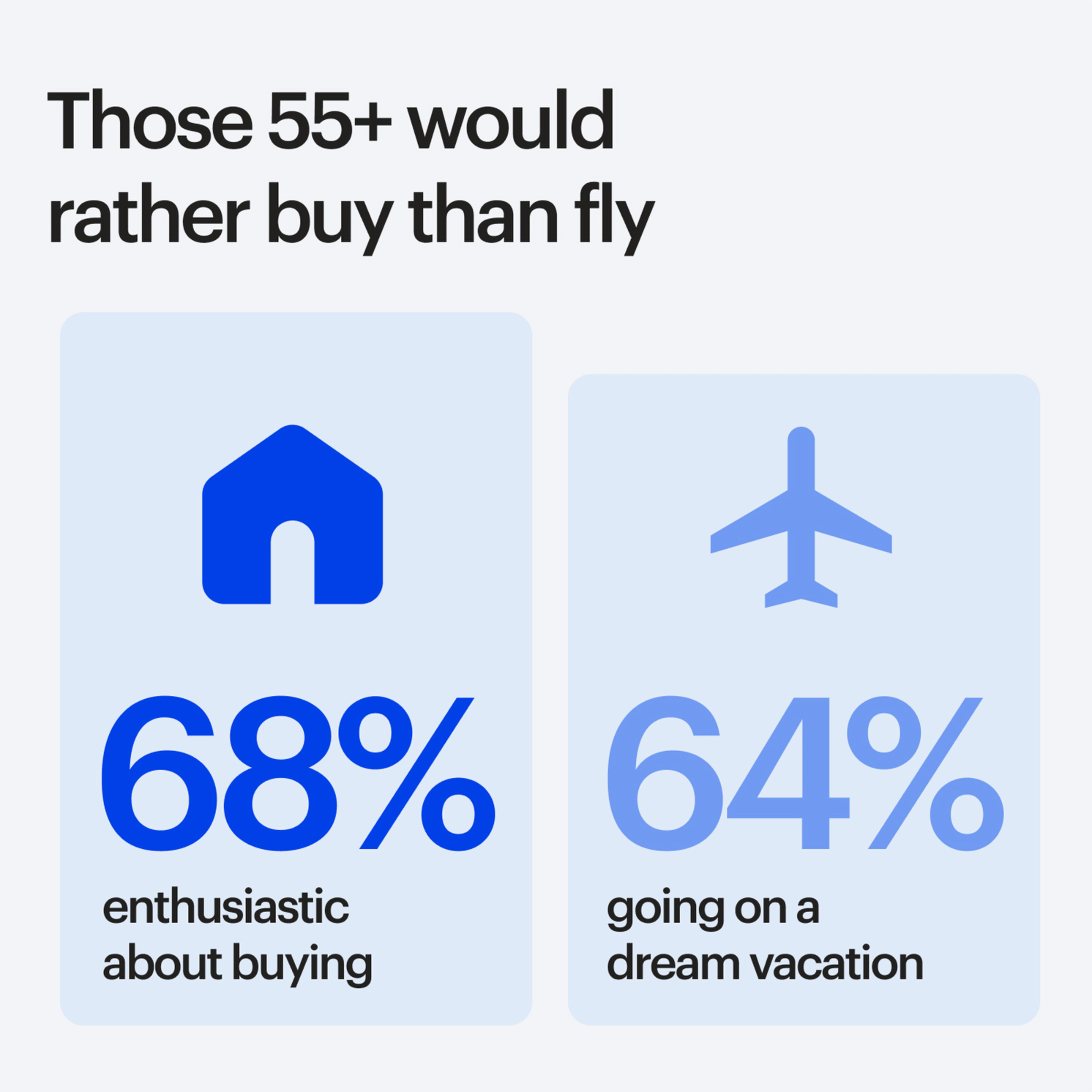“We hear directly from our customers just how emotional the moving process can be,” says Kerry Melcher, head of real estate at Opendoor, a company that buys and sells homes online.
To get a better understanding of the emotions involved, Opendoor commissioned a survey, conducted in late 2023, of over 2,000 US adults who had bought or sold homes (or had begun to do so) within the previous year.
The resulting report, Emotions in Real Estate, focuses specifically on the behaviors and emotions of Gen Xers and boomers—citing what’s been dubbed the great wealth transfer of $68 trillion projected to pass on to younger generations. That wealth includes real estate, as boomers currently own about 32 million homes.
The upshot? A significant majority (66%) of home buyers and sellers ages 55 and over say they’re emotionally attached to their homes. “Sentimentality is an oft-ignored consideration for 55+ home sellers and buyers,” the report concludes.

Notably, about 56% of home buyers and sellers 55 and over have lived in their homes for at least 15 years. Perhaps not surprisingly, the longer people live in their homes, the more attached they feel to them. “Emotional attachment can prolong older homeowners’ moving timelines—in turn affecting the great wealth transfer,” Melcher says.
Sellers 55 and over feel either moderately (37%) or strongly (29%) attached emotionally to their homes. These sellers are also concerned about pricing, timing, listing, and lining up a purchase—but those aren’t their biggest worries. For sellers, the top challenge in selling is letting go of a home with sentimental value. “This suggests that attachment and fondness for one’s home shapes moving timelines more than expected,” Melcher says.
To gain further insight into the emotions involved in selling, the survey asked respondents to compare home selling to other major milestones. Selling a home ranks as the most stressful life event (say 65% of 55+ sellers and buyers)—which ties with starting a new job (65%) and surpasses planning a wedding (48%). “Baby Boomer and Gen X respondents told us that stress is all too common in the home buying and selling process right now,” Melcher says.
Another indicator of their stress level when selling? Almost 1 in 4 sellers didn’t enjoy a single step of the selling process.
Both selling and buying stresses out the 55-plus cohort—but home buying also excites them. Over two-thirds (68%) says they’re most enthusiastic about buying a home, with traveling to a dream vacation (64%) a close second and home renovation (52%) a more distant third. “This suggests that older Gen Xers and boomers’ wanderlust and DIY passions are a priority for their second or third acts,” Melcher says.

How Home Buyers and Sellers Can Target Gen X and Boomer Homeowners
Overall, those trying to sell to or buy from older homeowners should bear in mind that, for this group, home purchases aren’t just financial transactions—they’re also deeply emotional ones.
When selling to 55-plus homeowners, consider the emotional ties they want to form with their new homes—and their new surrounding communities. “Homeowners can sell to this age group by selling the neighborhood as much as the house to help future buyers envision their lives there,” Melcher says. Selling the neighborhood can involve creating a homeowner book filled with suggestions about where the buyers might shop, eat, or take their dogs.
When trying to buy homes from older sellers, consider that “parting with a home can be more difficult than it sounds,” Melcher says. In the Opendoor survey, one-third of respondents say closing the deal means saying goodbye to a place with many memories, with more than 1 in 5 citing emotional ties to the home as a top factor influencing their selling decisions.

“Many sellers want to feel like buyers appreciate their home as much as they do—that it’s going to loving hands—and that starts with a fair offer,” Melcher says. Buyers can also sweeten the deal by offering the sellers more time before moving out, she adds.
Developers targeting older buyers should consider generational differences, Melcher advises. To appeal to 55-plus buyers’ excitement about starting the next phase of life, developers can offer communities with active-senior amenities such as pools, athletic facilities, and spaces for socializing. “Buyers who consider homes in these communities may have a better time visualizing what their next step could look like, making the transition easier.”
Melcher also emphasizes what Opendoor calls “simple-sizing”: embracing an easier-to-manage lifestyle that includes not just downsizing but an overall less-is-more approach to where and how one lives. Per another Opendoor survey conducted last year, 52% of Americans want smaller homes and the vast majority (81%) want simpler style or design. Boomers will be looking for smaller homes with efficient floor plans, Melcher says.















